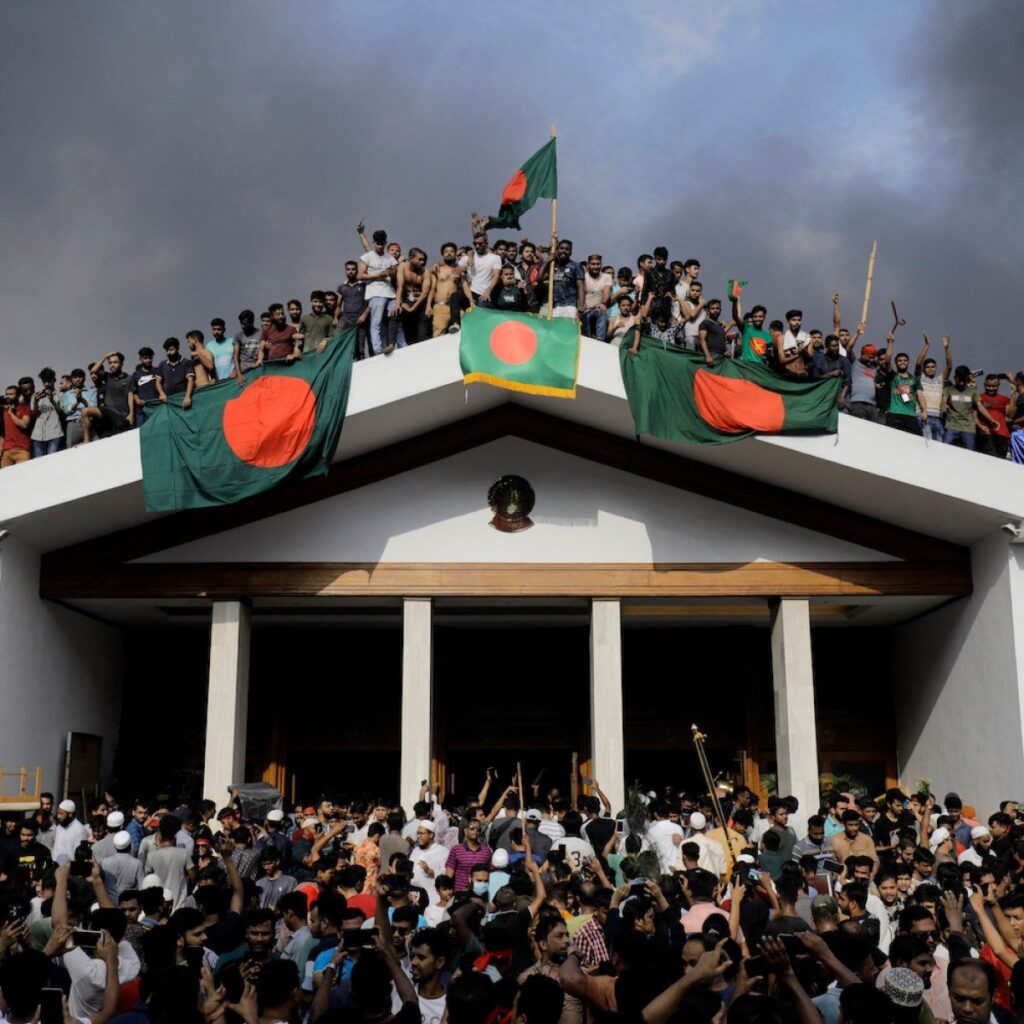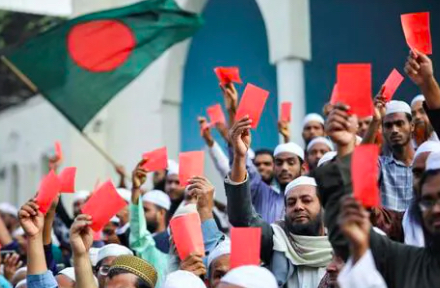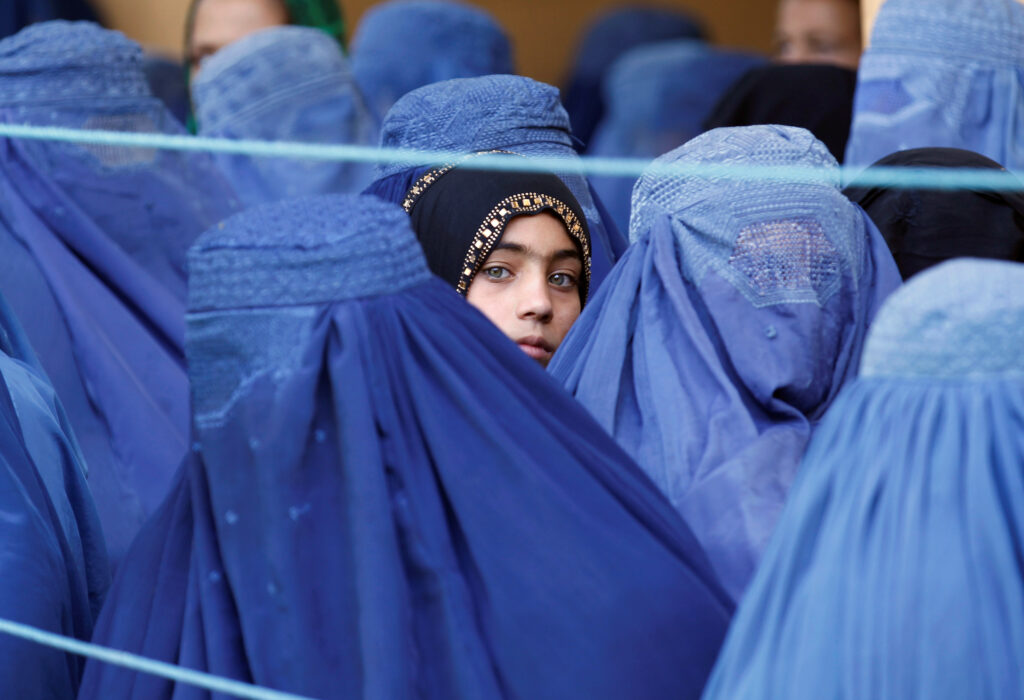MANTRAYA POLICY BRIEF#51: 06 AUGUST 2024
BIBHU PRASAD ROUTRAY
Abstract
The political fortunes of Prime Minister Sheikh Hasina and the Awami League party in Bangladesh underwent swift changes on 5 August 2024. She woke up to continue her repressive measures against an anti-establishment movement that had gathered enormous momentum, only to find herself bereft of power in a safe house in India by the evening. Apart from the new challenges that India will have to confront having lost an ally in the coming days, weeks, and months in the neighbouring country, Sheikh Hasina’s downfall has broader ramifications for Indian policy-making in the immediate neighbourhood.

(Anti-government protesters storm Prime Minister Sheikh Hasina’s palace in Dhaka, on 5 August 2024)
A Strategic Shock
The political upheaval in Bangladesh is bound to have taken policymakers in New Delhi by surprise. A flurry of post-event appraisal notwithstanding, none saw this coming, as was the case with Afghanistan. Keeping with the strong historical bond that the country shares with Sheikh Hasina and the Awami League (AL), New Delhi has received her as a guest. The challenges for New Delhi are now to reassess its past policies and try to find its feet in the neighbouring country, where it no longer enjoys a significant advantage. For that to happen, New Delhi’s Bangladesh policy has to emerge from a phase of hibernation and inertia to resolute action. And a new way of thinking, away from run-off-the-mill analysis and conspiracy theories, must begin.
The Disadvantages
India’s response to the violence that preceded Sheikh Hasina’s resignation and flight from the country, although outwardly demonstrated a policy of ‘non-interference’ in the ‘internal matters’ of Bangladesh, was an unequivocal support for the policies of the AL government. It was (mis)guided by the assessment that the upheaval is the creation of radical Islamists and anti-India elements. There seemed to be a conviction of sorts that she would ultimately prevail with an iron hand policy. The pattern of violence even after her resignation and move out of the country substantiates the point to a degree. However, it must be recognised that her actions emboldened AL’s opponents and unified them. What started as a student movement, transformed into a mass movement, allowing all sorts of simmering discontent to snowball. Not surprisingly, as a result of India’s support for her, anti-India sentiment within Bangladesh have increased.
India has been courting AL for a very long time, since the general elections of 2008. It has supported Sheikh Hasina during each subsequent election and even gone to great lengths to protect her from American pressure. As a result, the Indian government’s connect with the opposition—the Bangladesh Nationalist Party (BNP) and the Islamist parties are almost non-existent. Establishing those contacts will be difficult, if not impossible.
Violence in Bangladesh is unlikely to subside quickly. In a deeply polarised country, which Bangladesh has always been, the AL facilities, office bearers, supporters and sympathisers will continue to be targeted in the coming weeks. The Bangladesh military may find it difficult to contain such retributive violence while trying to guard its image as a people-friendly force that was instrumental in making the unpopular Hasina resign. This cycle of organized as well as reactionary violence may push a huge number of people towards India including the traditional Hindu supporters of the AL. Even with its heightened border security, the flow of refugees might become too overwhelming for India to contain.
(Also Read: New Delhi’s Strategic Challenges in Dhaka)
The New Realities
Two types of fears have been expressed in the Indian media about the political future of Bangladesh. One, it will become a haven for Islamists, Pakistan, and hence, anti-India sentiments. Secondly, China will exploit the political change to its advantage. Although Hasina courted Beijing, the latter, unlike India doesn’t have AL baggage to carry in post-5 August Bangladesh. Neither of these apprehensions can be rejected. However, such fears alone can’t be drivers of the official policy.
To present Hasina’s downfall as a machination of the Islamists and anti-India groupings demonstrate a very narrow and ill-founded understanding of the political reality in that country. An article even paints the Bangladesh army chief Gen Wacker-us-Zaman as pro-China. Such injudicious analyses ignore the various ways in which regimes, apparently strong externally, can collapse quickly due to a combination of factors. Worse still, it still absolves Hasina of all the policy missteps she took in her 15-year-old career and camoflouges India’s policy bungle in the past years of supporting her with its eyes wide shut.
That Hasina and the AL will rule Bangladesh for eternity and India can garner a strategic advantage only through bilateral visits and infrastructure projects was a policy befuddle of gigantic proportions. This could have been the outcome of the way New Delhi formulates its policy, without having its ears on the ground and prioritizing the region, despite its much-avowed ‘Neighbourhood First’ policy. A similar fate could await India in Myanmar in the coming months, where India follows a policy of unequivocally supporting the repressive and illegal military regime.
The Long Road Ahead
The decision-makers in New Delhi must factor in the following truisms:
- The violence and mayhem that took place in Bangladesh since July 2024, especially in the past few days, were avoidable. Having presided over such repression, the AL has become a hugely unpopular entity in that country. Any prolonged stay of Sheikh Hasina in the safe house in the national capital territory will fuel anti-India feelings within Bangladesh even more. It is in New Delhi’s interest that such political baggage and backlash are best avoided.
- The military in Bangladesh is the most important entity currently. Over the decades, there have been strong linkages between the Indian and Bangladesh military establishments. The Bangladesh army chief is unlikely to revoke that, in favour of China and Pakistan. India will continue to enjoy the advantage, despite the recent inroads attempted by Beijing in the form of a joint military exercise. India will need to explore opening channels of communication to ensure that the democratic processes are adhered to and the borders are secured.
- The interim government to be set up in Bangladesh isn’t the final political settlement in that country. It could merely be a stop-gap arrangement, before the military reveals its long-term plan of action, i.e. whether to hold an election or to continue ruling the country from the backstage. Therefore, while New Delhi doesn’t have to be overly reactive to the composition of the interim government, which will invariably feature BNP, Jamaat-e-Islami and Jatiya party leaders, it will have to prepare to deal with the future political developments in that country.
- The biggest challenge for New Delhi will be to shed a lot of baggage, tactically as well as emotionally. It will have to find new allies and actors to broaden its support network. And most importantly, it must open its eyes and ears to the new realities in Bangladesh. A policy bereft of people connect, human intelligence and vision of the neighbourhood, and relying on safe options can only be self-defeating.
(Dr. Bibhu Prasad Routray is the Director of MISS. This Policy Brief has been published as part of the ongoing “Fragility, Conflict, and Peace Building” project. All Mantraya publications are peer-reviewed.)




